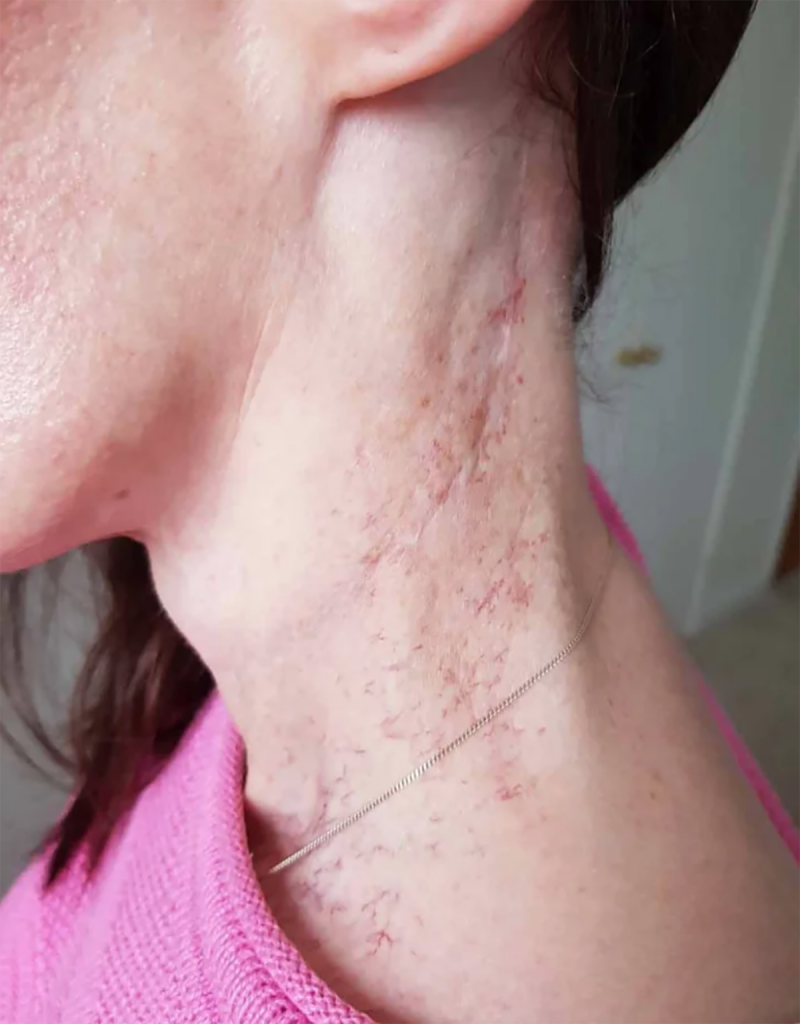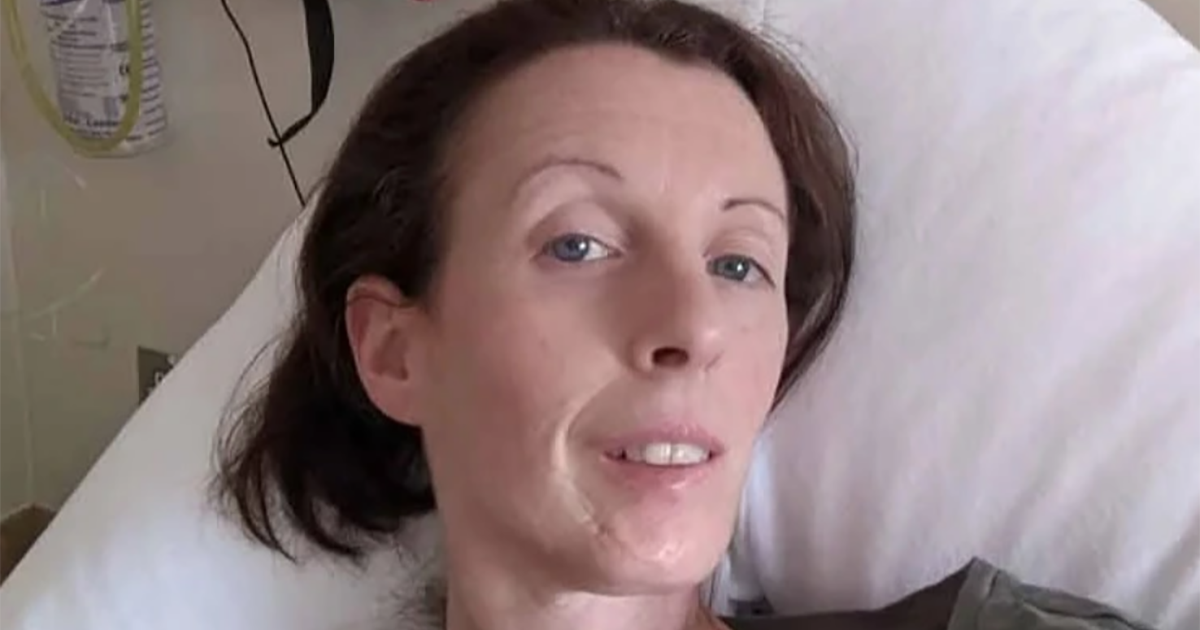Understanding Salivary Gland Cancer
- A mother in England never thought that her toothache would turn out to be an incurable salivary gland cancer.
- While it is unknown what caused Palfrey's salivary gland cancer, it is known that HPV causes a large percentage of head and neck cancers.
- Some cancer warriors will live cancer-free for the rest of their lives after treatment, but for others, it is possible to get a new, second cancer, like in Palfrey's case (she developed cancer in her lungs). It is important for all survivors to know that it is possible to develop an entirely new cancer, even after surviving the first.
Christine Palfrey, 42, was told at the time of her diagnosis in 2013 that she had three years left to live after being diagnosed with incurable cancer of the salivary glands, but now, nine years later, she is thriving.
Read MoreChristine's Incurable Cancer Diagnosis
It was December 2012 when Palfrey, a former dental nurse, began experiencing pain in her jaw. "I'm an ex-dental nurse, so I thought it couldn't be my wisdom teeth because I was in my thirties," she says. "I was sure it would be something and nothing maybe a little bit of food that had got trapped."But the pain prompted her dentist to X-ray her jaw. The dentist became concerned with what he saw; he was not sure what it was, but referred Palfrey to the hospital for further examination. But she did not suspect salivary gland cancer to be her outcome.
"He (the dentist) said it could be an abscess, but he didn't want to speculate and said he would refer me to a specialist in the next couple of days, which, of course, set off alarm bells," Palfrey says. "When I left, I thought, 'He can't think it's an abscess, or he'd have given me antibiotics.'"
"I still didn't think for one second it would be cancer, because nobody in my family has had it," she adds.
Once at the hospital, a solid lump was found in her mouth. However, the doctor who found the lump reassured her it could be benign (non-cancerous). That was not the case, and once Christmas passed that year, she returned to the hospital and her worst fear was confirmed. She had salivary gland cancer.

Palfrey was diagnosed with adenoid cystic carcinoma, which is a relatively rare form of cancer that most commonly develops in the salivary glands or other regions of the head and neck. According to the American Cancer Society, one in 100,000 people are diagnosed with this cancer.
Despite Palfrey's estimated three-year lifespan, ACS reports that about 72% of people diagnosed with salivary gland cancer are still alive at least five years after being diagnosed.
"I didn't know anything about cancer back then. He (the doctor) told me it was stage 4 and said although it was treatable, it was not curable," she says. "I asked how long I had left to live and he said, generally, three to five years."
One week after receiving the news, Palfrey underwent a 12-hour surgery to remove the cancer.
Dr. Jessica Geiger, a medical oncologist specializing in head and neck cancer at Cleveland Clinic Cancer Center, tells SurvivorNet that the first question often asked is whether the patient can undergo a procedure.
"The treatment for a local head and neck cancer, whether it's on the tongue or in the back of the throat, often the first question is whether or not the patient can have surgery," she says.
"Certainly for head and neck cancer that occurs in the oral cavity, so that's the oral tongue, or the buccal mucosa, the floor of the mouth, surgery is definitely the first option and has to be considered," she adds. "And it should be considered at a large institution that performs these very complex procedures and the following reconstruction following those surgical procedures with an experienced head and neck surgeon."
Palfrey's surgeon took bone from her hip to replace the section of her jaw riddled with cancer. This surgery reshaped Palfrey's face and she was left with a long, jagged scar running down her neck. She also had to learn how to speak again.
Palfrey had a long road ahead of her. She spent the next year recovering from the surgery, as well as radiation treatments she had to rid her body of the cancer. But the radiation burned off the skin of her face, neck and ears.
Nine years have passed since this life-changing experience, and now, Palfrey says, "I am in a good place. I have my next scan in February, so the baseline is that I am not cured but I have been successfully treated."
HPV & Cancer
While it is unknown what caused Palfrey's salivary gland cancer, it is known that the human papillomavirus, or HPV, causes a large percentage of head and neck cancers.
HPV and Cancer Risk: The Basics
"From the 1980s to the 2010s, the rate of HPV-related head and neck cancers has gone up by 300 percent," Dr. Ted Teknos, a head and neck cancer specialist, and president and scientific director of University Hospitals Seidman Cancer Center in Cleveland, Ohio, tells SurvivorNet.
The vast majority of humans in the United States both men and women will eventually get infected with HPV (a sexually transmitted disease), according to Dr. Allen Ho, a head and neck surgeon at Cedars-Sinai.
Second Cancer
One would hope Palfrey's medical nightmare would stop there, but that was unfortunately not the case for her.
Two years after her jaw surgery for salivary gland cancer in 2013, Palfrey had another operation to remove a second cancer after doctors found two tumors in her left lung. Then, last summer, she had another two operations to treat the cancer in her right lung. The good news is that her scans are now coming back clear with no evidence of secondary cancer.
Oftentimes, a cancer survivor's worst fear is facing the disease again whether that be a recurrence or an entire second cancer. (If cancer is found after treatment, and after a period of time when the cancer could not be detected, it is called a cancer recurrence, according to ACS.)
Some cancer warriors will live cancer-free for the rest of their lives after treatment, but for others, it is possible to get a new, second cancer, like in Palfrey's case. According to ACS, it is important for all cancer survivors to know that it is possible to develop an entirely new cancer, even after surviving the first.
That sounds scary; what is a "second cancer"? A second cancer is different from a cancer recurrence, which is when the same type of cancer a person had before comes back.
A second cancer is a new cancer that is unrelated to any previous cancer diagnosis; it is a completely different type of cancer. Sometimes the new cancer is in the same organ or area of the body as the first cancer, or a second cancer may develop in another organ or tissue.
Learn more about SurvivorNet's rigorous medical review process.


